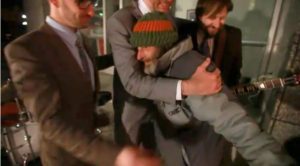By Richard Markosian
The Daniel Day Trio surprises street performer Eli Potash with a new cello. Watch the video.
Probably the most touching story not found in the news during the holiday season came from a video posted on YouTube. Eli Potash is a street performer who has been seen around downtown Salt Lake City performing on his cello for the past 10-15 years. Usually set up in front of the Broadway Theater, Eli’s hair is disheveled; his clothes are worn and his cello has seen better days.
In other interview’s (also found on YouTube) Eli’s articulation as to how he made the decision to become a street performer and make his living that way is surprisingly profound: Eli sees music as culture and enlightenment.
This is surprising because one might assume that Eli—as I have described him– could be homeless or mentally challenged, neither of which are the case.

Daniel Day knows that Eli is something of a diamond in the rough. “He has a really cool personality, a great sense of humor, and honestly I really like the way he plays the cello,” said Day. Day adds, “seeing Eli before going to movies, has really become a part of the downtown experience.”
Day and his two other band members decided to do something very nice for Eli. They purchased an old Cello with a lot of potential and restored the instrument to gift to Eli. In the video posted on YouTube we see Day and his band play a nice rendition of Silent Night before Day presents Eli with the gift.”This is the best Christmas ever!” Eli says after the exchange. The astonishment on Eli’s face and his reception to the charitable act are extremely heart warming. I would encourage everyone to watch. The video is produced by Sindewinder Media, the photo for this story is captured from the video.
In other YouTube videos posted by Charles Schneider we get to know a little more about Eli and his story
Eli Potash came to Salt Lake City to study violin making at the Peter Prier Violin making School. Which is probably the best violin making school in the country.
There Eli learned that he could never become a great violin maker. But Eli decided to stay in Salt Lake City and play the cello.
“That word ‘play’ again, you ‘play music’ but you do ‘art work’. So everybody who sees me thinks, ‘oh there he is happily playing his music.’ But its actually hard work!”
In another quote Eli says, “I think about two things, music and myself, which might be more than most people because of the music.” Eli also says that music is nothing to him unless he is making his living doing it.”
“There are also some problems on the sidewalk, There are drunks, there are trouble makers there are pests of all kinds. And sometimes I get into altercations and my equipment keeps getting damaged. Somebody robbed me a few nights ago.” Eli described how he fought a man for a five dollar bill and broke his cello in the melee.
“Music is language, it patterns our brains. Music is ideas, it doesn’t exist as a physical entity. It’s what it does to us that matters. It changes us, it changes what we are. I feel like I’m educating the public by playing this music.
Bach is the father of all musicians.” These quotes were taken from a video on Eli by filmmaker Charles Schneider.

